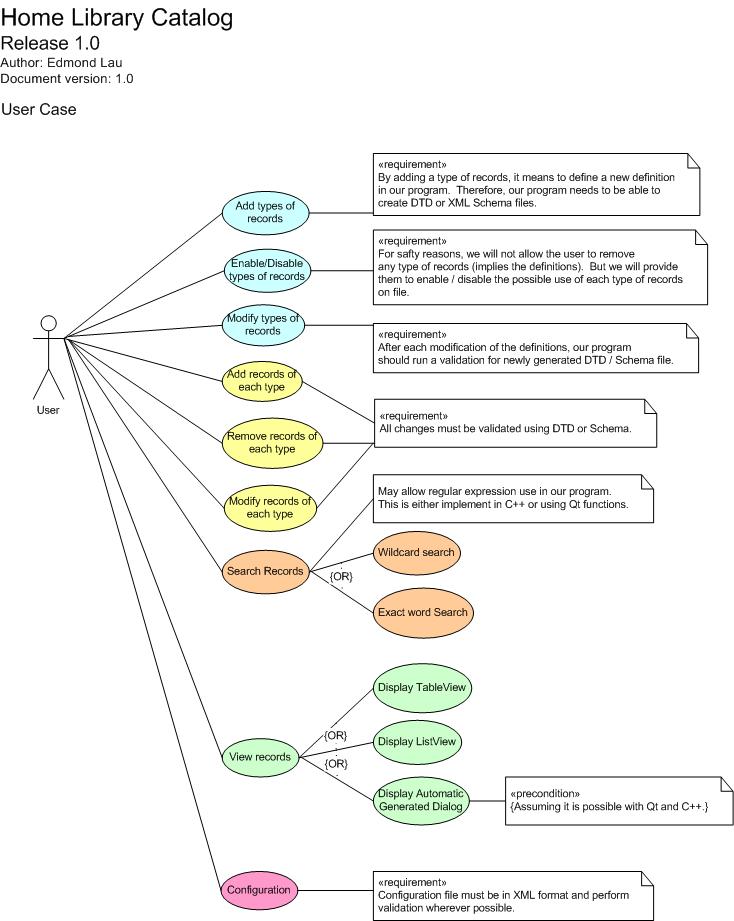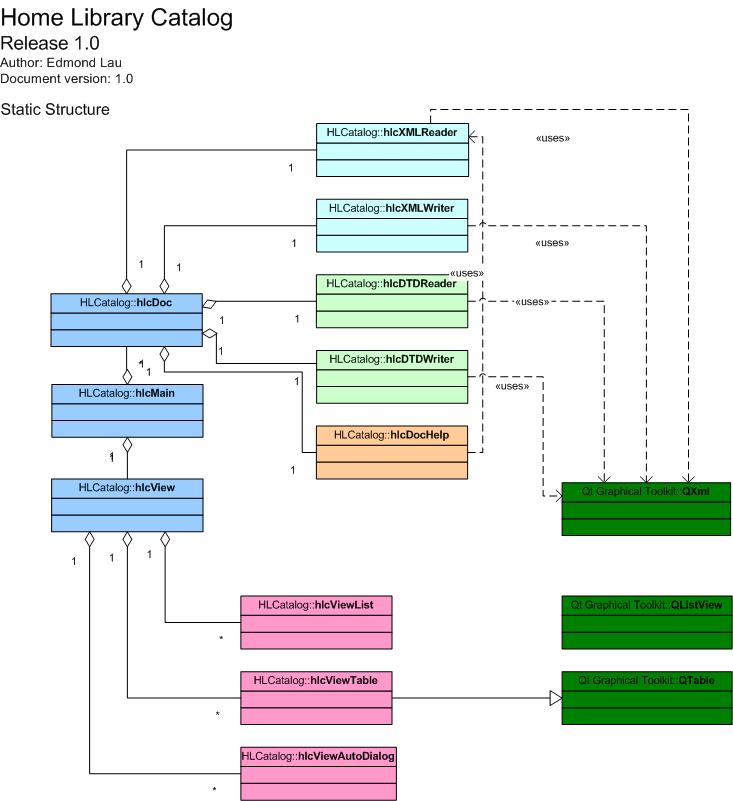This is the on-going design document of the project - Home Library Catalog. Our team is currently drafting the specification and designing the structure of our project. Hence this document will change constantly in the next couple of weeks. For the newest information regarding to our project, please visit http://hlcatalog.sourceforge.net. Whereever possible, we will add diagrams to this document to make our ideas more concrete. If readers has any suggestions regarding to our specification and design, please feel free to e-mail our project leader - Edmond Lau. Any suggestions / comments are always welcome.
The initiation of the Home Library Catalog - HLCatalog - or simply HLC - is to develop a program that help end-users to store information of their CDs, Books, DVDs, and many other types of media. But since everyone has their own personal preferences of how these information are stored, we are going to design our program in such a way that it will be able to adapt these changes in the most convinent way for the end-users.
We are going to use C++ to develop the HLC. The front-end Graphical User Interface (GUI) will be developed using the Qt Graphical Toolkit (3.1.0+). The data of each type of records by the user are going to be stored in separate XML documents. We are planning to use DTD files for definitions and XML validations.
The following is a list of requirements for the release 1.0 of HLC:
Will include more detail later on. MDI is preferred, but SDI is also cool. We will try to include prelimiary screen shots of the prefered screen layout.
All the data in our program are stored in XML formats. Hence we will need tools and functions for: DTD validation, DTD parsing, XML validation, XML parsing, etc. In the first release of HLC we will include simple tools to do such work, where they will be based on the Qt XML module. We will extend these XML functionalities in later versions of HLC. Whenever possible, HLC will perform validation of the documents. In the cases where the DTD or XML files are corrupted, HLC should have functions to fix simple problems in the documents. However, this error correction functionality may not be included until later versions.
We will include more information about the development cycle when our design reach certain level of maturity. In short: spiral development model. Basically we are going to state a few development milestones, and for each milestone we will do: analyse, design, allocate resources, implement, testing, documentation, and review. Our project will not deploy any major version until all requirements are met.
C++ coding convention is still an open issue.
The following is an user scenarios proposed by D'laila. We will leave this as open discussion.
Developers will decide this issue when development is started.
The following is a list of issues that we should discuss within our design process:
The following is the use case diagram:

The following is the class diagram:

The following is an example of DTD definition file for books:
<!-- By Edmond Lau for hlcatalog --> <!-- status: draft, have not validated yet --> <!ELEMENT books (book*)> <!ATTLIST books name CDATA #IMPLIED> <!ELEMENT book (title, author, publish, bought, location, extra)> <!ELEMENT title (#PCDATA)> <!ELEMENT author (#PCDATA)> <!ELEMENT publish (by, date, pages, isbn, webpage)> <!ELEMENT by (#PCDATA)> <!ELEMENT date (#PCDATA)> <!ELEMENT pages (#PCDATA)> <!ELEMENT isbn (#PCDATA)> <!ELEMENT webpage (#PCDATA)> <!ELEMENT bought (#PCDATA)> <!ELEMENT location (where, loan?)> <!ELEMENT where (#PCDATA)> <!ELEMENT loan (#PCDATA)> <!ELEMENT extra (comments, rating)> <!ELEMENT comments (#PCDATA)> <!ELEMENT rating (#PCDATA)>
The following is an example of XML data file for books:
<?xml version="1.0"?>
<!DOCTYPE books SYSTEM "books.dtd">
<books xmlns:="hlcatalog.sourceforge.net/books" name="My Book Collections">
<book>
<title>Programming with Qt, 2nd Edition</title>
<author>Mattbias Kalle Dalheimer</author>
<publish>
<by>O Reilly</by>
<date>January 2002</date>
<pages>500</pages>
<isbn>0596000642</isbn>
<webpage>www.oreilly.com</webpage>
</publish>
<bought>May 2002</bought>
<location>
<where>bookshelf 2</where>
<loan> </loan>
</location>
<extra>
<comments>This books is very useful.</comments>
<rating>4</rating>
</extra>
</book>
<book>
<title>Essential GIMP for Web Professionals</title>
<author>Michael J. Hammel</author>
<publish>
<by>Prentice Hall</by>
<date>2001</date>
<pages>355</pages>
<isbn>0130191140</isbn>
<webpage>www.phptr.com/essential</webpage>
</publish>
<bought>May 2002</bought>
<location>
<where>bookshelf 2</where>
<loan>lend to Bob Foo</loan>
</location>
<extra>
<comments>This is not a bad book, but the authors could add more real life examples.</comments>
<rating>3.5</rating>
</extra>
</book>
</books>